If you run an MSP business, you’re probably doing a bit of everything - fixing tech issues, talking to clients, managing your team, and more. But one thing that’s easy to overlook? Your online presence. You could be the best at what you do, but if people can’t find you on Google, it’s hard to grow.
Here’s the thing: 75% of users never scroll past the first page of search results. That means if your website isn’t ranking well, most people won’t even know you exist. To make it easy for you to find a reliable SEO partner, we’ve picked out some of the best MSP SEO companies that know how to get your business noticed. These MSP SEO companies know the industry, understand what works, and can help you get in front of the right people without the stress of figuring it all out yourself.
List of the best MSP SEO companies:
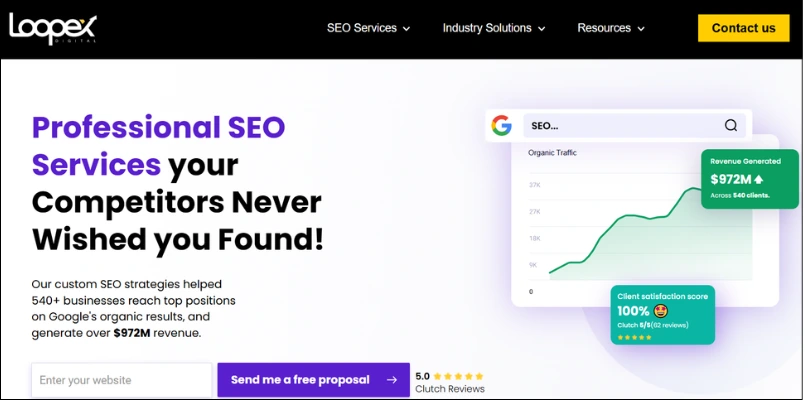
Loopex Digital is among the best MSP SEO companies that offers 100% SEO services. They have already helped over 540 businesses earn more than $972 million in revenue with their targeted SEO strategies. Their process starts with a full SEO audit and competitor check, followed by a custom strategy to target the most valuable keywords for your services. Loopex Digital improves website’s structure, creates expert content, and builds strong backlinks to improve rankings. They give regular updates, clear reports, and don’t lock you into long contracts. It’s a simple, results-driven service for MSPs that want to grow.
What Client Needed:
Wave, a Canadian company offering digital business cards for enterprise, wanted to improve their SEO and build a stronger online presence. Their goal was to increase organic traffic, improve keyword rankings, and gain quality backlinks.
What Loopex Digital Did:
Loopex Digital provided SEO services and guest post outreach. Their team handled everything by finding relevant sites, creating content, pitching and publishing guest posts. They also developed a full content strategy and optimized Wave’s website.
How It Worked:
The collaboration was smooth. Client shared that Loopex Digital delivered work on time, communicated clearly, and quickly adjusted to any feedback. They gave regular updates, and showed the progress and impact of their work.
Results:
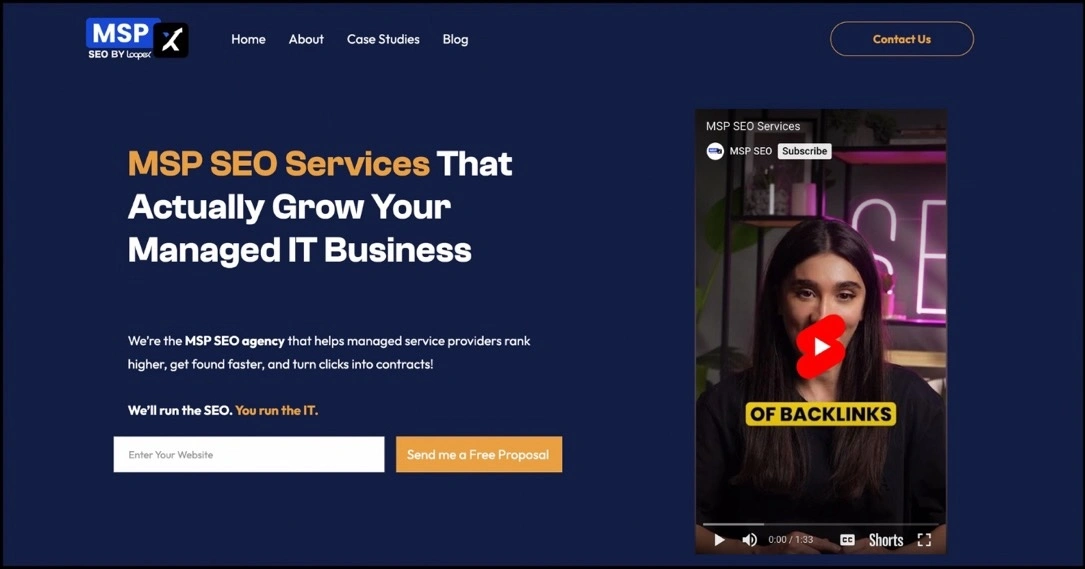
MSP SEO Agency by Loopex Digital is a specialized SEO company that focuses exclusively on managed service providers. They get the real challenges MSPs deal with every day - tight budgets, slow sales cycles, and needing to earn trust fast with local clients. They start by checking out what your competitors are doing, then focus on the right keywords and getting solid backlinks that actually matter. Working with 100+ MSPs worldwide, they've driven over 50,000 organic leads and regularly deliver 10x+ returns within 6-12 months.
What Client Needed:
The Orange Crew, a managed IT services provider in Orange County with over 20 years of experience, had a serious online visibility problem. Despite their solid reputation and technical expertise, their domain rating was stuck at just 11, putting them at a disadvantage against competitors. They had no rankings for core MSP and IT services terms that their target market was searching for.
What MSP SEO Agency Did:
MSP SEO Agency focused on getting The Orange Crew noticed by the right publications and directories in the tech space. They also figured out exactly how local businesses in Orange County were searching for IT help and built their keyword strategy around those real searches.
How It Worked:
The team analyzed competitor strategies and identified gaps where The Orange Crew could gain visibility. Each link opportunity was carefully evaluated for relevance to managed IT services and potential to enhance credibility among Orange County businesses. The keyword strategy balanced competitive IT service terms with location-specific searches.
Results:
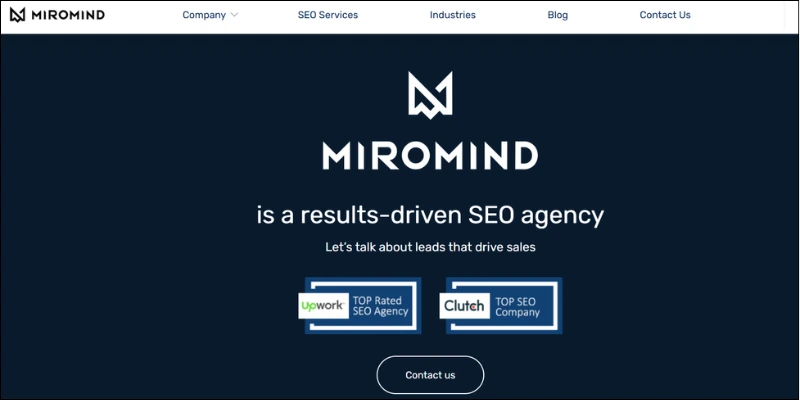
MiroMind is an SEO agency with over 15 years of experience helping MSPs and IT companies get more traffic, leads, and sales. They focus on bringing the right visitors to your website, people who are looking for services like yours. Their team starts by checking your website, researching keywords, and looking at your competitors. Then they create a plan to improve your rankings with better content, technical fixes, and strong backlinks. They also help you show up in local searches, which is important if you serve a specific area or have more than one location. With clear reports and no long-term contracts, MiroMind makes it easy for MSPs to grow online.
What Client Needed:
KubeSphere, a Kubernetes management platform, wanted to boost their visibility in the global market. Their goal was to drive more traffic to their website through high search engine rankings.
What MiroMind Did:
MiroMind handled the full SEO process, starting with a technical audit, keyword research, and content recommendations. They also built backlinks and optimized key pages to improve search performance.
How It Worked:
KubeSphere worked directly with an account manager and two SEO specialists. Communication was fast and smooth through Slack and monthly check-ins, with quick turnarounds and clear progress updates.
Results:
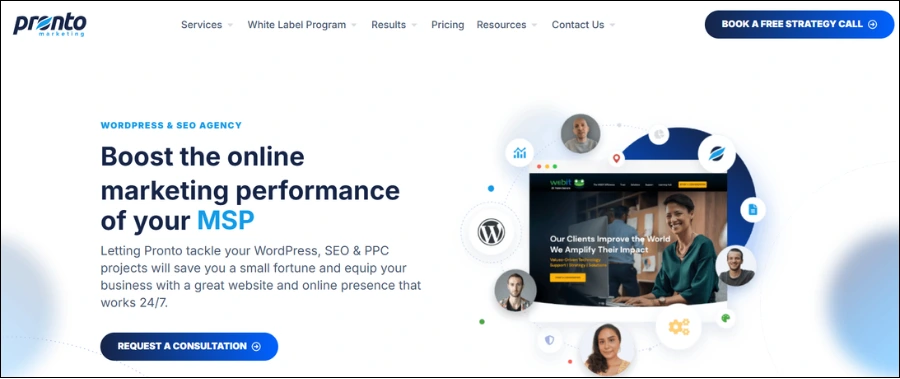
Pronto Marketing is an experienced SEO and WordPress agency that helps MSPs improve their online visibility and get more leads. With over 15 years in the industry, they’ve worked with hundreds of managed service providers to build strong websites, improve search rankings, and grow local and national reach. Their team offers full SEO services, including website audits, keyword research, local SEO, link building, and content writing. They also provide ongoing support, clear monthly reports, and fast communication. Pronto makes it simple and effective for MSPs to grow online, get found on Google or even build a new website.
What Client Needed:
A managed IT services provider in Los Angeles hired Pronto Marketing to help with lead generation and improve their digital marketing strategy.
What Pronto Marketing Did:
Pronto provided a full range of services, including SEO edits, blog and newsletter creation, website updates, landing page and banner design, and regular content updates across platforms.
How It Worked:
Tasks were submitted via email and tracked through a ticket system. The team responded quickly, typically within 24-48 hours, and consistently delivered everything on time. Communication was smooth and reliable.
Results:
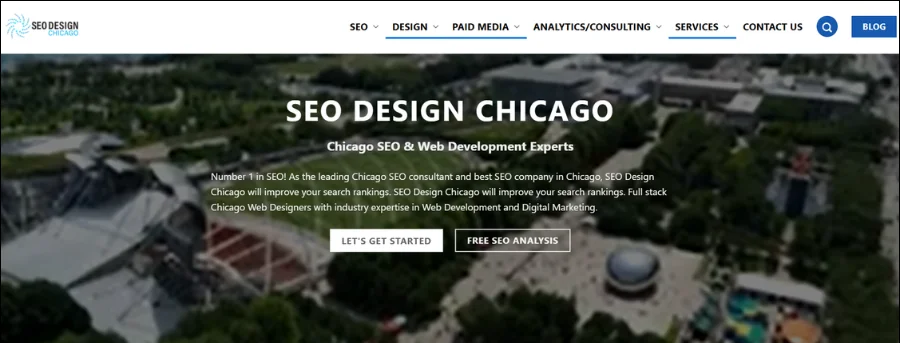
SEO Design Chicago is a digital marketing agency that helps MSPs grow by improving their online presence. They offer services like SEO, local search, paid ads, web design, and content writing, all focused on IT and managed service providers. With over 10 years of experience in the MSP space, their team understands how to attract the right leads and turn website visitors into clients. They build fast, easy-to-use websites, help MSPs show up on Google, and provide clear reports to track results.
What Client Needed:
The client needed help improving their site’s search rankings through high-quality content creation, backlink building, and fixing technical SEO issues, all targeting highly competitive keywords.
What SEO Design Chicago Did:
SEO Design Chicago wrote content and built links to resolve technical problems. They also adapted quickly to shifting goals and supported the client through budget changes.
How It Worked:
The team worked closely with the client, stayed flexible, and communicated clearly. Their performance reports were honest and straightforward, no fluff, just results.
Results:

Lemonade Stand is a full-service digital marketing agency that helps MSPs and other service businesses get more leads online. What makes them different is their real experience. Lemonade Stand was started by someone who actually owned and sold a successful MSP. They know the challenges MSPs face and use proven methods to help them grow. They offer a wide range of services including website design, SEO, content marketing, paid ads, social media, and more. Their team creates custom plans for each business and gives regular updates through a personal account manager.
What Client Needed:
The client was looking for a marketing partner tp help them grow business through effective strategy, content, and execution created for their brand and industry.
What Lemonade Stand Did:
Lemonade Stand developed marketing campaigns based on the client's unique voice and goals. They helped in content creation, strategy, and continued execution.
How It Worked:
The team acted like an extension of the client’s own team, showing up with dedication, understanding the business deeply, and consistently delivering quality work across all touchpoints.
Results:
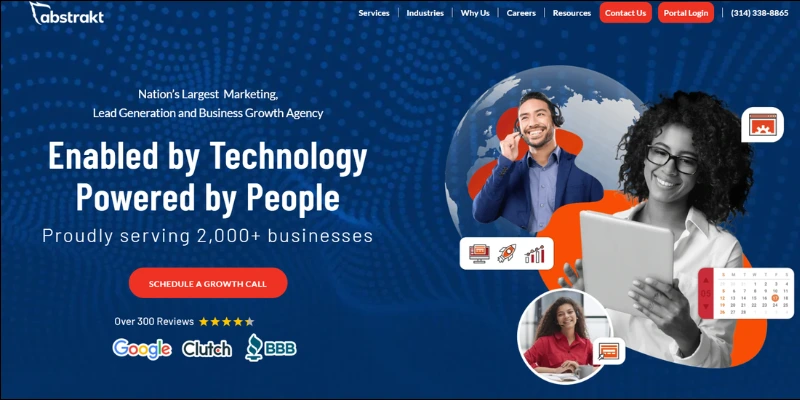
Abstrakt Marketing Group is a U.S. agency that helps MSPs and other businesses get more leads and grow. They offer services like cold calling, email outreach, SEO, and appointment setting. Their team finds the right people, sets meetings, and helps MSPs fill their sales pipeline. They work with over 2,000 companies and have more than 15 years of experience. MSPs get a full team and tools without having to hire in-house. Abstrakt shares updates every month and focuses on getting real results. Many MSPs have closed big deals and gained steady monthly income through their work with Abstrakt.
What Client Needed:
TeamLogic IT needed support with lead generation and content marketing to drive new business and increase closed deals.
What Abstrakt Marketing Group Did:
Abstrakt provided end-to-end content marketing and lead generation services, focusing on delivering qualified leads and helping convert them into customers using proven sales tactics.
How It Worked:
The 2-5 experts group worked together through virtual meetings, met deadlines on assignments, and responded timely to each requirement. Their project management was flawless and efficient all along.
Results:

Digital Success is a Dallas-based digital marketing agency that helps MSPs and other businesses grow online. They create custom marketing plans using SEO, PPC, content, social media, and website design. Their goal is to bring more traffic, leads, and sales to your business. They focus on what makes your MSP different and help you stand out from competitors. Digital Success has worked with over 2,000 clients and managed over $50 million in ad spend. They also offer real-time reporting so you can track your results. Their team understands MSP marketing and helps you reach the right people at the right time.
What Client Needed:
AlisQI, a quality management platform, wanted to increase their inbound website traffic and generate more high-quality leads through SEO and content marketing.
What Digital Success Did:
Digital Success acted as an outsourced SEO and content team, handling keyword research, competitor analysis, on-site optimizations, backlink building, and content creation, including writing blog posts.
How It Worked:
The collaboration was informal yet proactive. Client mentions that communication occurred through Basecamp and sporadic bi-weekly phone calls. The team checked in prior to making any changes and offered suggestions the client had not considered, which made them part of the internal team.
Results:

Incrementors is a full-service digital marketing agency that helps businesses grow by increasing website traffic, leads, and sales. They focus on real results, not just clicks or views. Their team offers services like SEO, PPC, website design, content marketing, and social media. They also specialize in lead generation and conversion strategies. Incrementors works with small and medium-sized businesses, including MSPs, and builds custom plans based on each client’s needs. They offer free website audits, 30-minute strategy sessions, and clear, simple communication through a dedicated manager. With over 10 years of experience, Incrementors has helped many clients double or even triple their revenue.
What Client Needed:
An IT services firm needed help fixing web and SEO issues left by a previous team. They were looking for a reliable partner to improve their websites and implement SEO content using Page Generator Pro.
What Incrementors Web Solutions Did:
Incrementors stepped in to handle digital marketing and web development. They fixed technical issues, deployed SEO-optimized content across multiple sites, and built a staging site to show progress clearly.
How It Worked:
The team communicated through Upwork and email, using visual project maps for clarity. They verified each step, provided daily updates, and showed strong dedication to understanding the client’s needs.
Results:
We carefully researched and handpicked the companies most capable of helping managed service providers grow online. Here's how we made our selections:
High Client Ratings
To make sure we’re recommending only high-performing companies, we focused on agencies with a minimum rating of 4.8 stars on Clutch or Google. A high rating reflects strong customer satisfaction, reliable communication, and consistent results.
SEO Service Focus
We focused on companies that have a strong background in SEO. Each one offers SEO as a core part of what they do, showing they have real experience helping businesses grow through search.
Experience with MSP Clients
Each agency on this list has a proven track record of working with MSPs or IT-related clients. We looked for case studies and specific mentions of MSP-related success stories to ensure relevance.
Range of SEO Services for MSPs
We included only those agencies that offer core SEO services MSPs need, such as on-page SEO, link building, local SEO, technical audits, and content creation.
Transparent & Real-World Results
We highlighted companies that could show measurable outcomes, like traffic growth, better keyword rankings, and lead generation. The case studies and results we reviewed reflect real success, not just vague claims.
Picking the wrong SEO service for your MSP company can waste time and money. Here’s what to look for when choosing an SEO partner for your managed service business:
1. Real Experience with MSPs
Make sure the agency has worked with other MSPs before. Look for examples, case studies, or client names that show they’ve helped similar businesses grow.
2. Understanding of MSP Challenges
MSPs have unique sales cycles and local competition. A good agency will understand how to target your service area, build local trust, and get you in front of the right audience.
3. Focus on Results, Not Just Rankings
Higher rankings are great, but only if they bring in leads and clients. The best MSP SEO companies focus on conversions, not just clicks.
4. Clear Services and Ongoing Support
Choose an agency that offers services you actually need: on-page SEO, link building, local SEO, technical fixes, and helpful content. Make sure they also give regular updates and help improve over time.
5. Proven Results You Can See
Look for companies that show real results, like traffic growth, keyword improvements, or lead generation. A reliable agency will be happy to share what they’ve achieved for others.
1. Why do MSPs need SEO services?
If your MSP doesn’t appear in search results, you’re losing business to competitors. SEO helps your website rank higher, drive more traffic, and turn visitors into paying clients.
2. How do I know if an SEO agency is right for my MSP?
Look for an agency that has worked with other MSPs, understands your services, and can show real results like increased traffic or leads. Avoid agencies that only focus on rankings, they should also help you grow revenue.
3. How long does it take to see SEO results?
Most MSPs start seeing noticeable results in 3-6 months. It depends on your starting point, how competitive your market is, and how strong your SEO partner’s strategy is.
4. What SEO services are most important for MSPs?
Key important SEO services for MSPs include on-page SEO (like optimizing your service pages), local SEO (to show up in nearby searches), technical SEO (fixing site issues), content creation, and link building. A good agency will offer all of these in a clear, ongoing plan.
Our blog covers a combination of industry trends and professional insights from behind-the-scenes experiences. We provide weekly updates on link building, content marketing, on-site and technical SEO, and more! Sign up for our newsletter and join our LinkedIn to be on top of industry trends!
